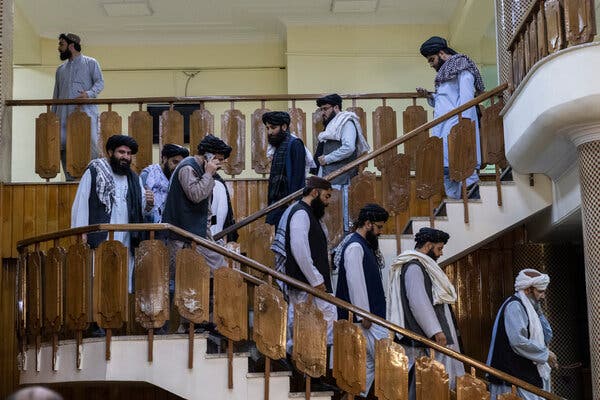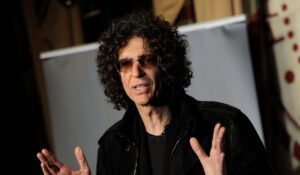KABUL, Afghanistan — The Taliban announced their choices for several acting cabinet positions on Tuesday, but held off on formally announcing a permanent government for Afghanistan.
In a surprise, Mullah Abdul Ghani Baradar, who had led the Taliban’s negotiations with the United States, was named as the acting deputy leader of the council of ministers — functionally, as deputy prime minister — rather than being named to the top post. Instead, the Taliban said that Mullah Mohammad Hassan Akhund, a founding member of the Taliban who served as foreign minister and deputy prime minister in the group’s first government in the 90s, was named to lead the council of ministers.
Sirajuddin Haqqani, a deputy leader of the Taliban insurgency and the leader of the terrorist-listed Haqqani Network, was named as acting minister of the interior. And Mawlawi Muhammad Yaqoob, who is the oldest son of the Taliban’s founding leader, Mullah Muhammad Omar, was named acting defense minister.
Running a government will most likely prove more daunting than toppling one. To succeed, the Taliban will need to secure desperately needed aid, which has been frozen by the United States and other nations. Foreign governments and lenders are waiting to see the fate of the opposition and if rights for women and ethnic and religious minorities will be respected.
Without that money, the government faces worsening challenges, including humanitarian and economic crises that have forced Afghans to flee. Basic services like electricity are under threat, and the United Nations warned that food aid would run out by the end of the month for hundreds of thousands of Afghans.
The Taliban, notorious for their brutality when they ran Afghanistan from 1996 to 2001, promised this time to put together a more inclusive government, including possibly including some non-Taliban figures in some form of informal advisory role. But none of that has materialized yet, and people with knowledge of the Taliban’s deliberations said that the real decision-making was an entirely internal process.
Jim Huylebroek and

Hundreds of women took to the streets of Kabul on Tuesday to demand that their rights be respected and were brutally sent scattering by the Taliban.
The protest made clear that Afghan women are unlikely to easily surrender the gains they have made over the past two decades. But it also offered a troubling signal that the Taliban may be determined to turn back the clock.
The demonstrators were peaceful, but as their numbers grew, and the women were joined by hundreds of men, the Taliban used force to crush a demonstration for the second time in less than a week.
They began beating protesters with rifle butts and sticks, witnesses said, and the crowd scattered after the fighters began firing into the air.
It was a remarkable public display by women, who suffered brutal subjugation the last time the Taliban were in charge of the country. Now, many fear that its professions of moderation notwithstanding, the group has not changed.
The protests on Tuesday were the second demonstration involving women in the nation’s capital in less than a week, and it was also the second to be crushed violently.
Rezai, 26, one of the coordinators and organizers of the latest protest, said the demonstration was organized in coordination with people trying to organize a national resistance to the Taliban.
“We invited people using social media platforms,” she said. “And there were more people than we expected. We are expecting more rallies tonight because people do not want terror and destruction. The Taliban have had no achievements since they have taken power except for killing people and spreading terror. So it was an utterly self-motivated protest, and we just coordinated and invited people to participate.”
As they marched on Tuesday morning, they carried a banner with a single word: “Freedom.”
The women chanted the same word as they walked, the Taliban watching closely. They were joined by men, many condemning Pakistan for what they view as its support for the Taliban and interference in Afghan affairs.
“We are not defending our right for a job or a position we will work in, we are defending the blood of our youth, we are defending our country, our land,” one woman said, according to video posted on social media.
Witnesses reported Taliban fighters beating demonstrators with clubs and rifle butts. Tolo TV, a leading Afghan broadcaster, said that one of its cameramen covering the protests was briefly detained by the Taliban.
As a photographer for The Times approached the demonstration on a street outside the presidential palace, known as the Arg, a convoy of at least a dozen Taliban pickup trucks raced toward the crowd.
As soon as the Taliban fighters dismounted their trucks, they started shooting — mostly into the air, it seemed. There were no immediate reports of severe injuries or fatalities.
The people — which appeared to number several hundred — started running.
The large gathering was over. A short while later, when some of the male protesters gathered in a small group and started shouting pro-resistance slogans, the Taliban chased them away.
After the crowd dispersed, Jamila, 23, said it had been a peaceful demonstration.
“The people just went to the streets and protested,” she said. But she worried that the Taliban’s tactics to break up the crowd could lead to bloodshed.

Unable to fly from Kabul’s airport, many people desperate to leave Afghanistan have flocked to the airport in the northern city of Mazar-i-Sharif. Now the airport is the latest flash point as the U.S. struggles to coordinate with its former Taliban adversaries to help those wanting to leave the country.
Secretary of State Antony J. Blinken, speaking to reporters during a visit to Qatar on Tuesday, said U.S. officials were “working around the clock” to ensure that flights carrying Americans and endangered Afghans can safely depart Afghanistan. He contested claims that the Taliban has blocked charter flights from departing the Mazar-i-Sharif airport.
Mr. Blinken said he was unaware of any “hostage-like” situation in Mazar-i-Sharif, contradicting a claim by a prominent House Republican that the Taliban were reneging on promises they have made to U.S. officials to allow safe passage from the country of foreigners and Afghans with valid travel documents.
“We have been assured, again, that all American citizens and Afghan citizens with valid travel documents will be allowed to leave,” Mr. Blinken said, adding that “we intend to hold the Taliban to that.
Mr. Blinken, who appeared alongside Secretary of Defense Lloyd J. Austin III and their Qatari counterparts, said Taliban leaders had recently reaffirmed that commitment. He pointed to the exit from the country Monday of an American family, that used an undisclosed land route. The Taliban knew what the family was doing but did impede them, U.S. officials say.
But in the case of Mazar-i-Sharif, Mr. Blinken said, the Taliban have objected to charter flights that combine passengers who bear valid travel documents and those who do not.
“It’s my understanding that the Taliban has not denied exit to anyone holding a valid document, but they have said that those without valid documents at this point can’t leave,” Mr. Blinken said. “But because all of these people are grouped together, that’s meant that flights have not been allowed to go.”
On Sunday, Representative Mike McCaul of Texas, the top Republican on the House Foreign Relations Committee, said on “Fox News Sunday” that the Taliban were blocking the departure of six flights from Mazar-i-Sharif that included American citizens and Afghans who had acted as interpreters for the U.S. military in Afghanistan. Mr. McCaul said the Taliban were holding the passengers “hostage” as they made demands of the U.S. government.
For more than a week, the airport in Kabul was a scene of nonstop chaos as Western nations raced to get their citizens and Afghan allies out of the county.
But after the last evacuation plane left on Aug. 31, the airport was eerily still, littered with left-behind belongings and disable equipment. With no one to run it, the Hamid Karzai International Airport was little more than a ghost town.
Now the Taliban are trying to get it up and running again.
Working with international partners, their goals is to restart full operations at the facility.
Turkey’s foreign minister, Mevlut Cavusoglu, said his nation was working with Qatar and other countries to help fix damage at the airport and to establish security protocols.
“The Kabul airport can be opened to international flights again, the damage can be repaired, the runway can be renewed, the terminal also renewed,” he said.
While security outside the airport can be maintained by the Taliban, Mr. Cavusoglu said, inside the facility it “should be maintained by a security company that is trusted” by the international community.
“There are companies that do this business, if military presence is unwanted,” he said.
Without such security, he said, it is unlikely that commercial flights would be able to resume. “Even if planes want to fly, the insurance companies will not allow,” he said in an interview with a private Turkish broadcaster.
At a news conference in Doha, Qatar’s foreign minister, Mohammed bin Abdulrahman bin Jassim Al Thani, said his government had sent a technical team to evaluate the Kabul airport. He expressed optimism that “we are about to get everything operational very soon.”
The airport as it stands now may be capable of receiving commercial flights for “a limited time in the day,” Mr. al Thani said. But it will require an equipment upgrade to operate as a standard international airport.
For now, Mr. al Thani said, Qatar is sending charter flights to Kabul bearing humanitarian aid on a near-daily basis.
Wali Arian and



















